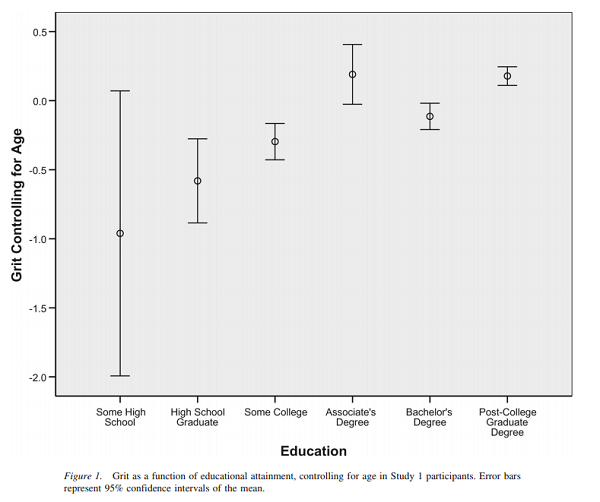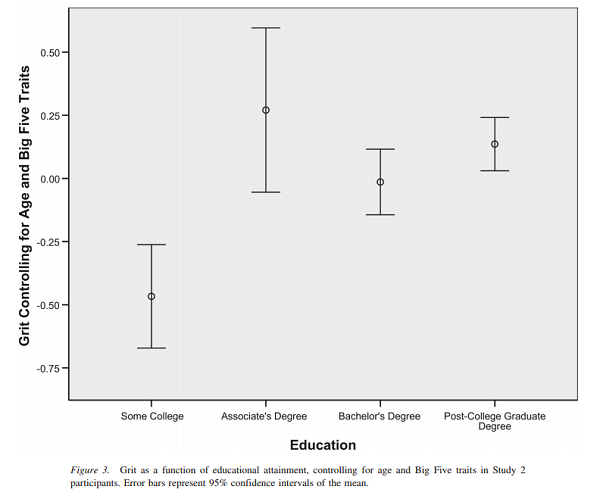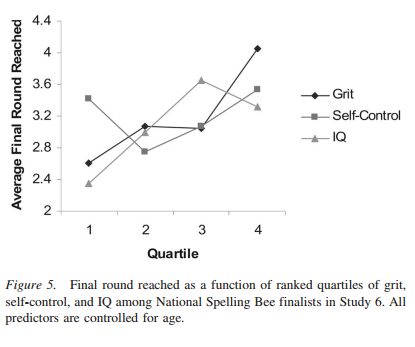Across six studies, the authors of this article attempted to prove the predictive validity of a new questionnaire which they created, the Grit Scale.
In the first study, grittier adults were more likely to have attained a higher level of education. In addition, grit was shown to increase with age, although because this study was correlational and not longitudinal, the result could be born from the cause that successive generations of adults are getting less gritty.
In the second study, grit was highly correlated with the personality trait of conscientiousness, was once again predictive of educational attainment, and was inversely correlated with lifetime career changes – that is, grittier individuals were more likely stick it out in the same career.
In the third study, grit was correlated with the GPA of college students, even after controlling for SAT scores.
In the fourth study, higher levels of grit increased the likelihood that a cadet would make it through Beast Barracks – cadets who were a standard deviation higher than average in grit were 60% more likely to complete summer training. However, self-control better predicted GPA than grit.
In the fifth study, higher levels of grit increased the likelihood that a cadet would make it through Beast Barracks, even after controlling for the personality trait of conscientiousness.
In the sixth study, gritty spelling bee national finalists reached higher rounds, in part because they spent more time studying.
Click here to learn more about grit.
Study Details
In study 1, 1,545 participants were asked to answer a 27-item grit questionnaire, as well as information about their age and educational attainment. Using the results, the 27 items were narrowed down to 12 items and two subscales: Consistency of Effort and Perseverance of Effort.
There was a statistically significant correlation between educational attainment and grit.
Grit also appeared to increase with age, although this could be because successive generations are less gritty, or because the accumulation of experience drives a increasing belief that one is gritty.
The authors suggest this is because at younger ages, novelty seeking behavior is more adaptive than grit (e.g. it's important to try many other things when young).
In study 2, 706 participants completed the same measures as in study 1, in addition to the Big Five Inventory.
Grit was correlated with conscientiousness (r=.77), but had incremental predictive validity for educational attainment and lifetime career changes over age and all five big five personality traits.
In study 3, 139 college students completed the Grit Scale, current GPA, expected year of graduation, gender, and SAT scores.
Grit was correlated with GPA (r=.25), and had incremental predictive validity over what was used as a proxy for intelligence (SAT scores).
In study 4, 1,219 freshman cadets who entered West Point completed the grit questionnaire, as well as a measure of self-control. These two factors, in addition to the whole candidate score (a combination of academic, extracurricular, and personality factors) were used to predict long-term performance, as well as retention through a brutal summer known as Beast.
Grit predicted retention through Beast.
Cadets who were a standard deviation higher than average in grit were more than 60% more likely to complete summer training, whereas cadets who scored a standard deviation above average in self-control were only 50% more likely to complete the summer course.
However, GPA was better predicted by self-control than by grit.
In study 5, 1,308 cadets completed the same measures as in study 4, but also the 9-item Conscientiousness subscale of the Big Five Inventory questionnaire.
Grit had incremental predictive validity over conscientiousness.
In study 6, 175 finalists in the Scripps National Spelling Bee completed the grit questionnaire, as well as a measure of self control, verbal IQ, study time, and how far they reached in the competition.
Gritty finalists reached higher rounds, in part because they studied longer. Self-control and verbal IQ also predicted performance, but not as much as grit did.
Full study here.
Finally, one proven way to improve your happiness and life satisfaction is to focus on goals that truly matter. To get started, check out this FREE printable worksheet and a step-by-step process that will help you set effective SMART goals.
Duckworth, A. L., Peterson, C., Matthews, M. D., & Kelly, D. R. (2007). Grit: Perseverance and passion for long-term goals. Journal of Personality and Social Psychology, 92(6), 1087-1101.




